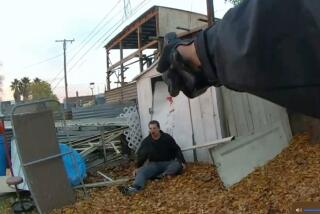Court Orders New Trial or Reduced Prison Term for Death Row Inmate
- Share via
SAN FRANCISCO — An Orange County man who has been on death row for 16 years won the right to a new trial or a reduced sentence under a divided ruling Thursday by the California Supreme Court.
The court, ruling that the prosecution failed to alert the defense to potentially exculpatory blood evidence, decided that inmate John Brown, 50, must either be retried or have his conviction reduced to second-degree murder.
Brown was convicted of first-degree murder and sentenced to death for the 1980 slaying of Garden Grove Police Officer Donald Reed, 27, at a Garden Grove bar. He also was convicted in the shootings of two other officers and two bar patrons, who survived.
Because the court’s ruling only affects the first-degree murder conviction, Brown “will probably end up spending the rest of his life in jail anyway,” said Supervising Deputy Atty. Gen. Robert M. Foster. Second-degree murder of a peace officer carries a sentence of 25 years to life.
Orange County Deputy Dist. Atty. Bryan Brown, who prosecuted the defendant, said Thursday: “This guy is not getting out. We’ll retry him.” The prosecutor added, however, that no decision has been made by his superiors.
A defense lawyer argued during Brown’s trial that Brown did not have the capacity to commit premeditated murder because he was under the influence of methamphetamines and alcohol at the time of the killing. But the only blood test presented at his trial showed no indication of drugs in Brown’s system.
Apparently unbeknown to the defense lawyers and the prosecutor, the blood had been examined using two different testing methods, one of which indicated the possible presence of phencyclidine (PCP). The court majority held that even if the prosecutor was unaware of that result, he had a duty to discover it and turn it over to the defense.
Los Angeles lawyer Donald Etra, who represented Brown on appeal, said he learned of the existence of the positive test in November 1993 while preparing to challenge Brown’s conviction in federal court.
“I had people at the Orange County forensic lab re-interviewed and then, bingo, we found this test that we had been looking for for 13 years,” Etra said.
The state Supreme Court appointed a referee, Orange County Superior Court Judge Daniel J. Didier, to review the case. Didier determined that the laboratory had sent the defense lawyer a copy of both blood reports and found no evidence that either the police or the prosecutor concealed the results. But the judge also found persuasive testimony by the then-defense lawyer that he had never seen the report.
It “probably disappeared somewhere inside the Orange County public defender’s office,” Deputy Atty. Gen. Foster said.
The court, in an opinion written by Justice Janice Rogers Brown, said the Orange County district attorney’s office was ultimately responsible for ensuring that the defense had the results of the other blood test.
“The evidence was readily accessible to the prosecution,” Brown wrote. “A cursory review of the crime lab’s file would have revealed the existence of the [other] test result. . . . The prosecutor acknowledged that he would have promptly divulged the information had he been aware of it. Regardless of the reason, he failed to do so.”
Garden Grove police officers were angered and stunned by the ruling.
“It’s just depressing,” said Capt. Dave Albrecht, who joined the force in 1977 with Reed and 15 other rookies. “This is a clear-cut case.”
Former Garden Grove Officer Dwight Henninger was among the officers who went to the bar to arrest Brown on outstanding warrants.
“He got up and tried to get away, and when he knew he couldn’t, he turned and shot randomly and in cold blood,” said Henninger, who was wounded in the shooting. “He was not totally deranged or out of his mind. He knew what he was doing.”
Justices Kathryn Mickle Werdegar, Stanley Mosk and Court of Appeal Justice Thomas F. Crosby joined Brown in overturning the first-degree murder conviction. Crosby reviewed the case in place of Chief Justice Ronald M. George, who recused himself because his elder son, a lawyer, worked on the case while in law school.
Thursday’s decision was the second time this week that the state high court overturned a death sentence. In a rare move, the court unanimously threw out a murder conviction and death sentence Monday of a Southern California man because of prosecutorial misconduct. Of the dozens of death sentences the court has reviewed in the past five years, only nine, including Brown’s, have been overturned.
In a dissent, Justice Joyce L. Kennard said the death sentence should stand because the “highly unreliable preliminary screening” that indicated the presence of PCP would not have changed the jury’s verdict.
Dolan reported from San Francisco and Boucher from Garden Grove.
More to Read
Sign up for Essential California
The most important California stories and recommendations in your inbox every morning.
You may occasionally receive promotional content from the Los Angeles Times.














